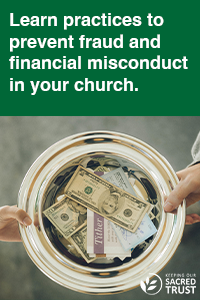Stewardship consultant Cesie Delve Scheuermann suggests planning your calendar of stewardship activities for the year. But before you do any asking, she stresses that you need to be deliberate about thanking contributors and telling the story of how their giving is changing lives and making the world a better place.
Now that Christmas is over, you have (maybe) a moment to catch your breath. It’s a good time to reflect on what you want to do to increase the generosity of your congregation in the coming year and plan a calendar of stewardship activities. If you’re nervous about this, make it simple. Take a calendar, pick some dates, and map out when you will:
1. Thank your congregation in worship
Every week or every other week, pick one ministry that your church supports (either directly or indirectly, for example through the use of your building), and say “thank you” to the people in the pews who make it possible for those ministries to happen. People will begin to actually believe that they are the generous people that they already are.
Before you do any “asking,” you need to be “thanking.” Make that your New Year’s resolution.
2. Thank people through personal notes
The phrase “have an attitude of gratitude” is so very helpful. What will be your “gratitude day”? Once a week, take a moment and write five thank you cards to people in your congregation. Even if they don’t give much, thank them for their faithfulness. Let people know that you realize that their tithe matters.
3. Thank people through impact reports in quarterly giving statements
This can come directly from you or from someone else in the congregation. It can paint an overall picture of what’s happening because of people’s generosity, or it can be an individual’s testimony of what the church and faith mean to him or her. Have a child, youth, or someone who you wouldn’t expect write a letter to the congregation. And make sure you say, “Thank you” a lot.
4. Plan a stewardship campaign
A recent email from Lovett Weems caught my attention: “Research suggests that church members who make pledges usually give at least 30 percent more than those who do not, and congregations that seek annual financial commitments have significantly higher levels of overall giving.” So get your stewardship campaign on the calendar now.
5. Determine which holidays and denominational priorities to highlight for special appeals
Easter, Thanksgiving, and Christmas are three traditional times that might warrant an “ask” letter or a special mention in worship. Individual denominations also have occasions where they want congregations to participate in a special focus above and beyond regular giving. You probably can’t do them all. So concentrate on a few and really promote them.
Do you see a pattern here? Before you do any “asking,” you need to be “thanking.” You should be thanking way more than you ask. And by thanking people, you do double duty: you can tell them how your church — through its faith in Jesus — is changing lives and making the world a better place. Thanking and telling good news: that’s definitely worth putting on a calendar. Make that your New Year’s resolution.
This article is adapted from Cesie Delve Scheuermann’s blog “Inspiring Generosity” and used with permission.You can connect with Cesie at inspiringgenerosity@gmail.com.
Related Resources
- Setting Stewardship Goals for the New Year by Clayton L. Smith
- Always Say Thank You by Cesie Delve Scheuermann
- 50 Ways to Encourage Faithful Giving, a free Lewis Center Resource






